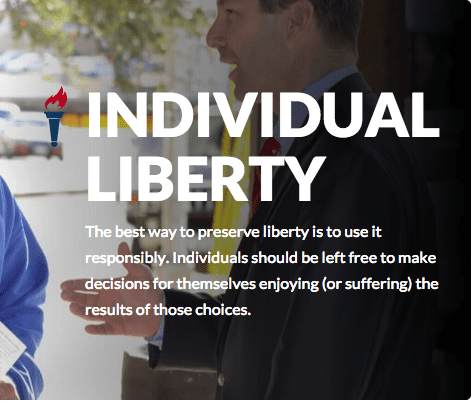The radical wisdom of Rep. David Simpson, the evangelical Christian from Longview

Rep. David Simpson, R-Longview, yesterday (Monday, June 29) called for a special legislative session “in light of the Supreme Court’s lawless and unconstitutional redefinition of marriage,” according to a statement released by his state senate campaign.
“I cannot and I will not sit idly by while unelected judges redefine the sacred institution of marriage and force our county and state officials to violate their most cherished beliefs,” he said. (No matter the decision was 5-4.)
But unlike Texas Eagle Forum’s Cathie Adams and other belligerently anti-LGBT crusaders who called for a special session this month barring recognition of same-sex unions, Simpson took a different approach. He wants government out of the equation.
“In its place, the process of issuing a certificate of marriage will be performed by any willing clergy member consistent with their conscience and in respect for our culture and our heritage,” he said, sticking to his deeply held conservative Christian convictions. But your marriage isn’t his issue: because if a couple doesn’t want to have a religious ceremony, a notary just needs to sign a certificate authorizing their marriage.
“Marriage is a divinely instituted tradition as old as humanity. Government marriage is just another government program and a modern failure. Government has cheapened it, redefined it, and parceled it out for profit,” he said. “As a Christian, I call on every Texan to reject this aberration and contact the governor to take swift action to end it.”
(His statement on the ruling itself, however, can be found here.)
I realize many of my colleagues may disagree with me on this, but it’s not that bad of an idea. I recognize Simpson’s ideology – very, very libertarian – and its flaws – libertarian Republicans oppose government regulation, including government-recognized employment protections. (Notice, however, that doesn’t mean opposition to private policies.)
However, I want to strictly speak in terms of marriage here, and the representative’s wisdom.
Of course, with marriage brings benefits (and federal tax incentives). And counties would lose some serious revenue if they no longer issued licenses, which mean a decline in services.
But to me, Simpson seems to be saying this: should the government capitalize upon our unions, or should they be cherished and sacred, free from interference? (Alternatively, and no disrespect to the representative’s faith, he’s saying “this is noneofya damned business!”)
Bucking the trend
You may have heard of Simpson this past session for making a similar argument on a different topic: weed.
“I don’t believe when God made marijuana he made a mistake that government needs to fix,” he wrote in op-ed in the Texas Tribune in March. “In the name of protecting the public, certain substances have been declared evil and contraband.”
In early May, seemingly out of nowhere, his bill decriminalizing marijuana statewide passed in committee. It was surprising that legislation by Simpson, who has bucked his party’s leadership even before he entered the Capitol in 2011.
First elected in 2010 in an upset over long time Rep. Tommy Merritt, an ally of Speaker Joe Straus, he has vocally opposed the speaker, who is disliked by numerous Tea Party Republicans. Simpson last cycle was one of the “Turner 19” who voted for Rep. Scott Turner, R-Frisco, for speaker over Straus. During the 83rd legislative session, Simpson even ran against Straus, though he ultimately withdrew his candidacy before the vote.
But over time, like some of his other rebellious but conscientious fellow Tea Party, he has gained his colleagues’ respect for being so gosh darn nice.
To be fair, Simpson has never been a LGBT ally. He won’t politically be on the front lines in the battle for legal recognition. He’s consistently been a darling of the religious right restricting women’s reproductive freedoms (which is none too surprising) but he wasn’t the face of the movement this session.
The government may mean different things to us, and Simpson and I likely disagree on the government’s role in addressing various inequities. In his genuine pursuit of individual freedom, the guy also makes a compelling point – even if you don’t agree with it. And that seems to be his point.
















